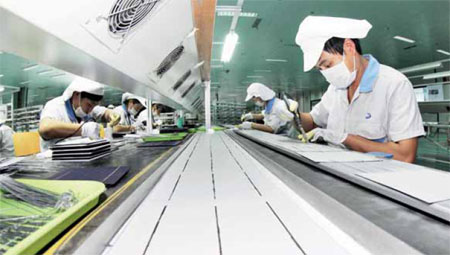New era for trade giants

Economic revival and talks on investment breathe fresh life into relationSHIP with europe
China and the European Union are looking forward to a new decade of closer economic ties as the bloc's economy picks up and an investment pact is under negotiation, officials say.
"Industrial complementarity between China and the EU is much more significant than the rivalry between them," Shen Danyang, spokesman of the Ministry of Commerce, said at a news conference on Jan 21.
"The prospect of bilateral trade and economic cooperation is very broad As EU economic growth picks up and the two sides start negotiations on the investment pact, there is reason to believe that this year China-EU trade and economic cooperation will grow quickly and in a better way, opening a new decade for the China-EU Comprehensive Strategic Partnership."
Four days earlier, the outgoing EU ambassador to China, Markus Ederer, said EU-China relations had improved over the past three years. While trade remains fundamental to the relationship, the two sides found new areas to work together such as urbanization, water, the Internet, defense and security.
"The-EU China relationship has matured," Ederer said. "Overall, I see very good momentum and I look forward to the relationship flourishing."
China and the EU are two of the world's biggest traders, and trade between them has surged in recent years. The EU is China's largest trading partner, while China is the EU's second-largest trading partner after the United States.
China is the EU's biggest source of imports and one of its fastest-growing export markets. Trade between China and Europe is now worth well over 1 billion euros ($1.37 billion) a day.
China's exports to the bloc are dominated by industrial and consumer goods, including machinery and equipment, footwear and clothing, furniture and lamps, and toys. China's imports from the EU are concentrated on machinery and equipment, motor vehicles, aircraft and chemicals.
The value of China-EU trade has exceeded $500 billion (365 billion euros) for each of the past three years and reached $559.06 billion last year, up 2.1 percent year-on-year, China's General Administration of Customs says.
In a survey by the Commerce Ministry, 24.5 percent of 1,900 Chinese trading businesses surveyed said their orders in the EU had risen 0.2 of a percentage point in December compared with November.
"Trade friction is nothing to fear, given the huge trade volume between China and the EU," says Shen of the Commerce Ministry. "The key is how to properly resolve friction The only way of resolving disputes is through consultation and dialogue. The proper settlement of the solar panel dispute showed that the two sides have the ability and the nous to control friction and safeguard our joint interest in working together."
China and the EU were on the verge of a trade war last year over solar panels sold in the EU. The EU said China was selling panels below cost and giving illegal subsidies to domestic manufacturers. China said the dispute put the jobs of 400,000 Chinese workers at risk. After Chinese Premier Li Keqiang intervened, there was a settlement that set a minimum price and a limit on the volume of EU imports of Chinese solar panels until next year.
"I'm proud we (were) able to solve the problem this way," Ederer says. "It sets a good model for resolving future trade disputes."
While there is a huge flow in goods between the two sides, trade in services amounts to just one-tenth of the trade in goods, and the EU's exports of services amount to just 20 percent of its exports of goods, the European Commission says.
Two-way investment also shows great untapped potential, particularly given the size of the two economies. China accounts for just 2-3 percent of overall European investment abroad, whereas Chinese investments in Europe are rising, but from an even lower base.
In Beijing on Jan 21, China and the European Union started the first round of negotiations to formulate an investment pact. The two exchanged views on the arrangement of coming negotiations and issues to be covered, the Chinese Commerce Ministry said.
The EU sees the investment agreement with China as an important element in closer trade and investment ties between the economies. On Jan 20, EU Trade spokesman John Clancy said the current level of bilateral investment between the EU and China is way below what one would expect from two of the most important economic blocs.
The main purpose of the negotiations is to progressively abolish restrictions on trade and foreign direct investment and to improve access to China for EU investors.
The negotiations started against the backdrop of China's ambitious economic reforms unveiled by the new leadership late last year. These include further opening up China's economy to foreign investors to boost innovation and competitiveness by having more advanced industries and services on the mainland.
Last year China's foreign direct investment from the 28-member bloc rose 18.07 percent year-on-year to $7.21 billion, while China's outward direct investment in the EU's non-financial sectors fell 13.6 percent year-on-year, the ministry says.
lijiabao@chinadaily.com.cn
| Workers at a solar panel production line in Lianyungang, Jiangsu province. The recently-resolved solar panel dispute between China and the EU shows that the two sides can settle trade disputes through negotiations. Si Wei / for China Daily |
(China Daily European Weekly 01/31/2014 page7)
Today's Top News
- Takaichi must stop rubbing salt in wounds, retract Taiwan remarks
- Millions vie for civil service jobs
- Chinese landmark trade corridor handles over 5m TEUs
- China holds first national civil service exam since raising eligibility age cap
- Xi's article on CPC self-reform to be published
- Xi stresses improving long-term mechanisms for cyberspace governance































